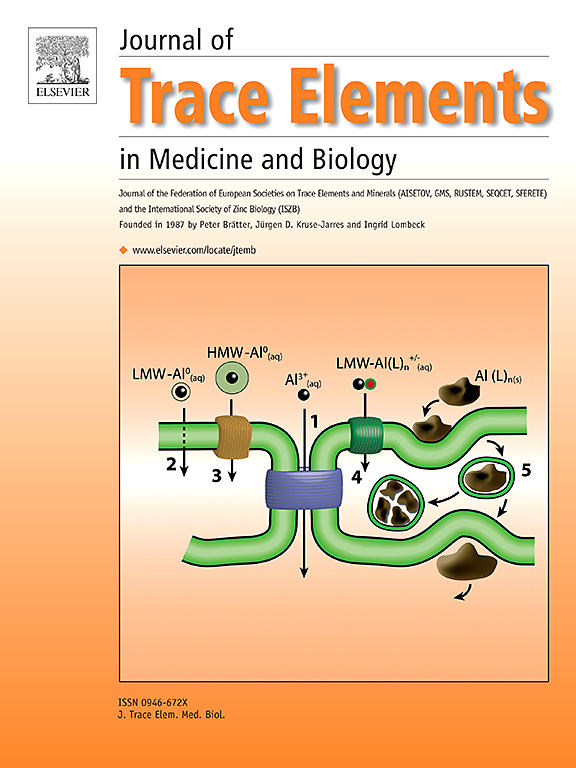钙摄入量与前列腺癌风险:前瞻性队列研究的系统回顾和剂量反应荟萃分析
IF 3.6
3区 医学
Q2 BIOCHEMISTRY & MOLECULAR BIOLOGY
Journal of Trace Elements in Medicine and Biology
Pub Date : 2025-04-10
DOI:10.1016/j.jtemb.2025.127652
引用次数: 0
摘要
背景高钙摄入量与前列腺癌(PCa)风险之间的关系很弱,两者之间的剂量反应关系仍不清楚。因此,我们进行了一项系统综述和剂量反应荟萃分析,以评估钙摄入量与 PCa 风险之间的关系。采用随机效应模型汇集总钙、膳食钙、补充钙、乳制品钙和非乳制品钙最高摄入量与最低摄入量的效应大小(ES)及 95% 置信区间(CI)。为评估它们之间的关系,还进行了线性和非线性剂量反应分析。总钙、膳食钙和乳制品钙摄入量高与 PCa 风险增加有关。总ES值分别为1.08(95 % CI 1.01-1.15)、1.16(95 % CI 1.08-1.24)和1.13(95 % CI 1.02-1.24)。补充钙和非乳制品钙摄入量与 PCa 风险无显著相关性。线性剂量反应分析表明,膳食钙摄入量(P-线性< 0.001)和乳制品钙摄入量(P-线性 = 0.02)与 PCa 风险呈正相关,总钙摄入量可能与 PCa 风险呈线性关系(P-线性 = 0.06)。每天额外摄入 300 毫克的总钙、膳食钙和乳制品钙分别会导致 PCa 风险增加约 2%、6% 和 5%。这些结果表明,总钙、膳食钙和乳制品钙的摄入量越高,患 PCa 的风险就越高。未来的研究应提供更详细的结果,包括不同钙来源与 PCa 亚型之间的风险。本文章由计算机程序翻译,如有差异,请以英文原文为准。
Calcium intake and risk of prostate cancer: A systematic review and dose-response meta-analysis of prospective cohort studies
Background
The association between high calcium intake and prostate cancer (PCa) risk is only weak, and the dose–response relationship between the two remains unclear. Therefore, we conducted a systematic review and dose-response meta-analysis to evaluate the relationship between calcium intake and PCa risk.
Methods
The databases were searched up to September 2024. Random-effects models were employed to pool effect sizes (ESs) with 95 % confidence intervals (CIs) for the highest versus lowest intakes of total, dietary, supplemental, dairy and non-dairy calcium. Linear and non-linear dose-response analyses were performed to assess the relationships between them.
Results
21 prospective cohort studies were included in this meta-analysis. High intakes of total, dietary, and dairy calcium were associated with an increased risk of PCa. The summary ESs were 1.08 (95 % CI 1.01–1.15), 1.16 (95 % CI 1.08–1.24), and 1.13 (95 % CI 1.02–1.24), respectively. Supplemental calcium and non-dairy calcium intakes were not significantly associated with PCa risk. Linear dose-response analysis indicated that dietary (P-linear < 0.001) and dairy calcium intakes (P-linear = 0.02) were positively associated with PCa risk, and total calcium intake was possibly linearly related to PCa risk (P-linear = 0.06). An additional intake of 300 mg/day of total, dietary, and dairy calcium is linked to approximately 2 %, 6 %, and 5 % increases in PCa risk, respectively. No non-linear dose-response relationships were observed between calcium intake and PCa risk.
Conclusions
These results demonstrate higher intakes of total, dietary, and dairy calcium were associated with an increased risk of PCa. Future research should provide more detailed results, including risks between different sources of calcium and PCa subtypes.
求助全文
通过发布文献求助,成功后即可免费获取论文全文。
去求助
来源期刊
CiteScore
6.60
自引率
2.90%
发文量
202
审稿时长
85 days
期刊介绍:
The journal provides the reader with a thorough description of theoretical and applied aspects of trace elements in medicine and biology and is devoted to the advancement of scientific knowledge about trace elements and trace element species. Trace elements play essential roles in the maintenance of physiological processes. During the last decades there has been a great deal of scientific investigation about the function and binding of trace elements. The Journal of Trace Elements in Medicine and Biology focuses on the description and dissemination of scientific results concerning the role of trace elements with respect to their mode of action in health and disease and nutritional importance. Progress in the knowledge of the biological role of trace elements depends, however, on advances in trace elements chemistry. Thus the Journal of Trace Elements in Medicine and Biology will include only those papers that base their results on proven analytical methods.
Also, we only publish those articles in which the quality assurance regarding the execution of experiments and achievement of results is guaranteed.

 求助内容:
求助内容: 应助结果提醒方式:
应助结果提醒方式:


